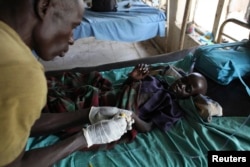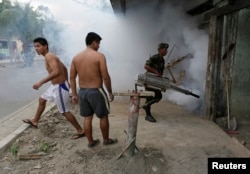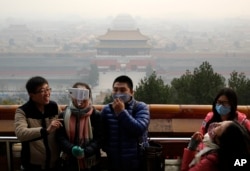The World Health Organization (WHO) is calling for a strong agreement to curb global emissions at the UN Climate Change Conference in Paris this week.
Climate change already is blamed for tens of thousands of deaths each year from shifting patterns of disease, extreme weather events, and worsening air and water quality and sanitation. WHO warns that by 2030, climate change will cause — at a minimum — an additional 250,000 deaths a year around the world.
Health has been central to global climate talks since nations first got together in 1992 to discuss the problem. In Paris this year, negotiators aim to keep emissions from rising more than 2 degrees Celsius above pre-industrial levels.
Holding temperatures at those levels is what scientists say it will take to avoid the most dramatic impacts of climate change, such as more intense storms, floods, droughts and wildfires.
World Health Organization senior scientist Diarmid Campbell-Lendrum says a climate accord could help avert millions of deaths.
"The reason that we are so concerned about the effects of climate change on health [is] that many of the largest disease problems that we face are highly sensitive to climate conditions,” he said. “These include diseases such as malaria, such as undernutrition, and such as waterborne diseases, diarrhea and other waterborne diseases."
Dengue fever, Lyme disease
A warmer and wetter world threatens to make these problems worse. That's exactly what's happening with Dengue fever, a mosquito-borne viral infection that has put almost half of the world's population at risk.
Erwin Saucedo is a local health director in Santa Cruz, Bolivia. He says the extended rainy season in 2009 had workers scrambling to control the epidemic.
"We think the 30,000 reported cases could easily be double that, getting to more than 50,000 to 60,000 because of unreported cases where people have done self-treatment," he said.
Dengue fever remains a leading cause of hospitalization in Latin America and Asia.
But vector-borne diseases are growing in the United States, as well, with ticks transmitting Lyme disease to some 300,000 people a year.
Becky Jacobs was diagnosed last year, but went untreated for almost two decades.
"Nobody could figure out what was wrong," she said.
Seventeen U.S. states are now high risk for this tick-born disease.
Rising temperatures also make air pollution worse. WHO's Campbell-Lendrum says dirty air — a combination of ozone and fine particles — is particularly bad for people who suffer from asthma or heart or lung disease.
"If we continue to use highly polluting energy systems, we will either maintain or increase the seven million deaths that we suffer every year from air pollution," he said.
Basic human rights
Clean air and water are basic human rights, says Campbell-Lendrum, adding that decision-makers must consider the compounded health problems associated with a warmer world.
"One of the main things that countries can do is to strengthen their health systems to protect populations from climate-sensitive disease risks,” he said. “We already have effective interventions against malaria, for example. We have effective interventions to protect our water and sanitation systems and to protect children from diarrheal disease. What we need to do is to strengthen those systems and also, particularly, to take account of the climate risks of all of those diseases."
A successful outcome in Paris, according to Campbell-Lendrum, would be an action-oriented agenda that both reduces climate-changing emissions to protect health in the long run, but also achieves the health benefits of a greener, more equitable and more sustainable economy.

















